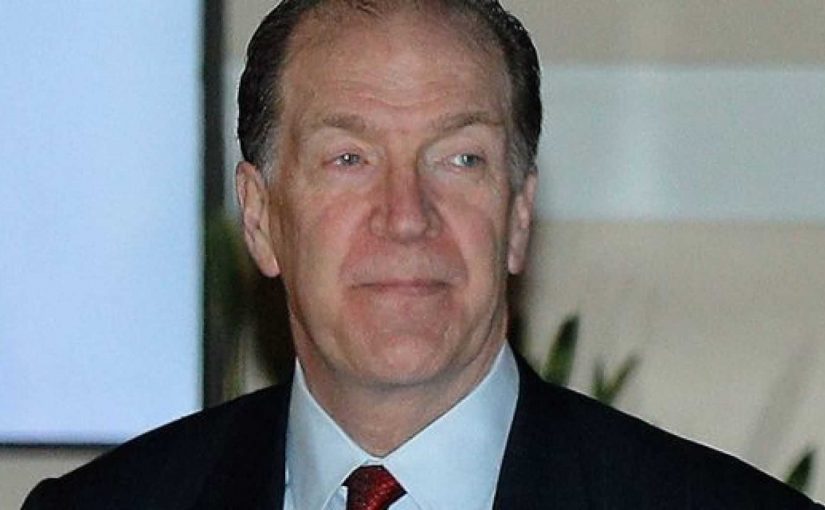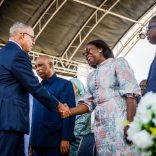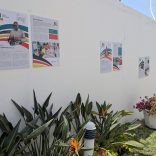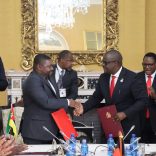Mozambique: Culture is an asset for the country's economy
World Bank’s Malpass travelling to Madagascar, Ethiopia and Mozambique this weekend

File photo: AP
Nearly 40 world leaders and scores of finance officials, including International Monetary Fund Managing Director Christine Lagarde, are gathered in Beijing for China’s second Belt and Road infrastructure summit, but the World Bank’s new president isn’t among them.
David Malpass, fresh from a senior Trump administration post at the U.S. Treasury Department, is instead making his first foreign trip as the World Bank’s leader to sub-Saharan Africa to highlight his vision for the bank’s poverty reduction and development agenda.
A World Bank spokesman said Malpass will be travelling this weekend to Madagascar, Ethiopia and Mozambique before flying to Egypt and a debt conference in Paris. Malpass has said that Africa is a key priority for the bank due to its high concentration of the world’s poorest people.
World Bank Chief Executive Officer Kristalina Georgieva, who had been acting president during the leadership selection process, is representing the institution at the summit and had accepted China’s invitation before Malpass started at the bank on April 9, the bank spokesman said.
Former World Bank President Jim Yong Kim attended China’s first Belt and Road summit two years ago.
Leaders of two of the countries on Malpass’ trip, Ethiopia and Mozambique, are among a number of African leaders also attending this year’s summit.
Malpass, who was the Treasury’s undersecretary for international affairs, is a longtime critic of China’s Belt and Road lending practices and had worked to raise alarms about them with G7 and G20 countries in that role.
“In lending, China often fails to adhere to international standards in areas such as anti-corruption, export credits, and finding coordinated and sustainable solutions to payment difficulties, such as those sought in the Paris Club,” Malpass told a U.S. House Financial Services subcommittee in December.
His absence coincides with a significant downgrade of the Belt and Road summit by the United States as the Trump administration tries to negotiate a deal to resolve longstanding trade and intellectual property disputes with China — talks in which Malpass frequently participated.
No high-level U.S. officials are attending, a State Department spokesman said, citing similar concerns about Belt and Road debt.
Malpass said at the IMF and World Bank spring meetings this month that meeting the development lender’s goals of ending extreme poverty by 2030 calls for a focus on Africa.
“By 2030, nearly 9 in 10 extremely poor people will be Africans, and half of the world’s poor will be living in fragile and conflict-affected settings,” he told a news conference at the meetings. “This calls for urgent action, by countries themselves, and by the global community.”
He told reporters on his first day on the job that he wanted to “evolve” the bank’s relationship with China to one where Beijing is a bigger contributor of capital and cooperates more closely with the bank on development issues and poverty reduction.
But Treasury Secretary Steven Mnuchin, Malpass’ former boss, on the same day told lawmakers that the World Bank under Malpass’ leadership and a new U.S. development agency “can be a serious competitor to (China’s) Belt and Road.”
About David Malpass
On April 5, 2019, the Executive Directors of the World Bank unanimously selected David R. Malpass as President of the World Bank Group for a five-year term beginning on Tuesday, April 9, 2019.
Mr. Malpass previously served as Under Secretary of the Treasury for International Affairs for the United States. As Under Secretary, Mr. Malpass represented the United States in international settings, including the G-7 and G-20 Deputy Finance Ministerial, World Bank-IMF Spring and Annual Meetings, and meetings of the Financial Stability Board, the Organisation for Economic Cooperation and Development, and the Overseas Private Investment Corporation.
In his role as Under Secretary, Mr. Malpass played a crucial role in several major World Bank Group reforms and initiatives, including the recent capital increase for IBRD and IFC. He was also instrumental in advancing the Debt Transparency Initiative, adopted by the World Bank and IMF, to increase public disclosure of debt and thereby reduce the frequency and severity of debt crises.
Prior to becoming Under Secretary, Mr. Malpass was an international economist and founder of a macroeconomics research firm based in New York City. Earlier in his career, Mr. Malpass served as the U.S. Deputy Assistant Secretary of the Treasury for Developing Nations and Deputy Assistant Secretary of State for Latin American Economic Affairs. In these roles, he focused on an array of economic, budget, and foreign policy issues, such as the United States’ involvement in multilateral institutions, including the World Bank.
Mr. Malpass has served on the boards of the Council of the Americas, Economic Club of New York, and the National Committee on US–China Relations. Mr. Malpass earned his bachelor’s degree from Colorado College and his MBA from the University of Denver. He undertook advanced graduate work in international economics at the School of Foreign Service at Georgetown University.
The World Bank President is Chair of the Boards of Directors of the International Bank for Reconstruction and Development (IBRD) and the International Development Association (IDA). The President is also ex officio Chair of the Boards of Directors of the International Finance Corporation (IFC), the Multilateral Investment Guarantee Agency (MIGA), and the Administrative Council of the International Centre for Settlement of Investment Disputes (ICSID).












Leave a Reply
Be the First to Comment!
You must be logged in to post a comment.
You must be logged in to post a comment.